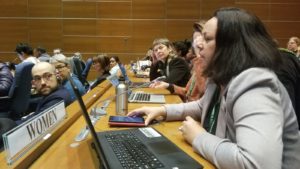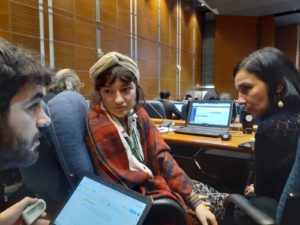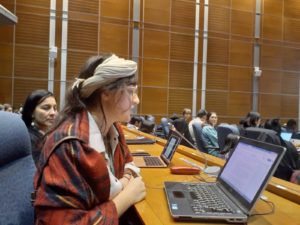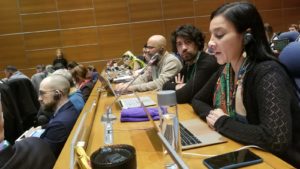November 24, 2019
The International Planning Committee for Food Sovereignty participated with three delegates (from International Indian Treaty Council and La Via Campesina) at the 11th session of the Ad Hoc Open Ended Inter-sessional Working Group on Article 8(j) and Related Provisions of the Convention on Biological Diversity, held in Montreal (Canada) from 20 to 22 November 2019. The International Planning Committee for Food Sovereignty (IPC) participated at the CBD meeting on the Article 8(j), in order to carry the voices of Indigenous Peoples and small-scale farmers organizations that contribute to the enhancement of biodiversity through their lifestyle intimately linked to the territory.  The context in which Indigenous Peoples and small-scale farmers work worldwide to conserve and sustainably use genetic resources, is changing at an ever-increasing rate. Small-scale producers and gatherers need to be recognized as positive drivers for the enhancement of biodiversity. Acknowledging that Indigenous Peoples traditional lands hold approximately 80% of the world’s biodiversity, and small-scale producers produce at least 75% of the world’s food supply, there is an urgent need to recognize and affirm the United Nations Declaration on the Rights of Indigenous Peoples and the United Nations Declaration on the Rights of Peasants and Other People Working in Rural Areas as a lens through which the Convention on Biodiversity should be implemented.
The context in which Indigenous Peoples and small-scale farmers work worldwide to conserve and sustainably use genetic resources, is changing at an ever-increasing rate. Small-scale producers and gatherers need to be recognized as positive drivers for the enhancement of biodiversity. Acknowledging that Indigenous Peoples traditional lands hold approximately 80% of the world’s biodiversity, and small-scale producers produce at least 75% of the world’s food supply, there is an urgent need to recognize and affirm the United Nations Declaration on the Rights of Indigenous Peoples and the United Nations Declaration on the Rights of Peasants and Other People Working in Rural Areas as a lens through which the Convention on Biodiversity should be implemented.  The IPC sadly noted the paternalistic and colonialist approach adopted in some background documents of the meeting. The IPC strongly supported a change in the use of terminology that could recognize the autonomy of Indigenous Peoples and would support our initiatives rather than propose ready-made programs. Our initiatives are already in place in those areas and need to be supported by Contracting Parties at national level, in order to avoid any use of land based on corporate interests. In the interventions made by the IPC, we recalled the Contracting Parties to allow Indigenous Peoples and small-scale farmers to manage and restore their agroecosystem using the framework given by the Article 9 of the International Treaty on Plant Genetic Resources to save, use, exchange and sell seeds from farmers to farmers with no limitations.
The IPC sadly noted the paternalistic and colonialist approach adopted in some background documents of the meeting. The IPC strongly supported a change in the use of terminology that could recognize the autonomy of Indigenous Peoples and would support our initiatives rather than propose ready-made programs. Our initiatives are already in place in those areas and need to be supported by Contracting Parties at national level, in order to avoid any use of land based on corporate interests. In the interventions made by the IPC, we recalled the Contracting Parties to allow Indigenous Peoples and small-scale farmers to manage and restore their agroecosystem using the framework given by the Article 9 of the International Treaty on Plant Genetic Resources to save, use, exchange and sell seeds from farmers to farmers with no limitations.  We also put the attention on the fact that traditional and Indigenous knowledge belongs to Indigenous Peoples and for this reason, free prior and informed consent (FPIC) must be exercised for Indigenous Peoples in a legitimate, transparent, effective way that respects local practices and that includes the possibility that the result of FPIC is the denial of external initiatives. In the closing statement, the IPC reminded to the Contracting parties that in the state where the CBD meeting is taking place, so-called ‘’Canada’’, colonialism is continuing. The cultural genocide is still ongoing in the provinces and the federal government is not taking meaningful action to end it. All across Turtle Island, also known as North America, Indigenous women are being killed, raped, abducted and sterilized. Indigenous children are being forcibly removed from their families to be raised by non-Indigenous families, Indigenous students are being prevented from speaking their mother tongue, the suicide crisis in Indigenous communities is alarming and there is an over-representation of Indigenous men and women in the jail system and in a homeless situation.
We also put the attention on the fact that traditional and Indigenous knowledge belongs to Indigenous Peoples and for this reason, free prior and informed consent (FPIC) must be exercised for Indigenous Peoples in a legitimate, transparent, effective way that respects local practices and that includes the possibility that the result of FPIC is the denial of external initiatives. In the closing statement, the IPC reminded to the Contracting parties that in the state where the CBD meeting is taking place, so-called ‘’Canada’’, colonialism is continuing. The cultural genocide is still ongoing in the provinces and the federal government is not taking meaningful action to end it. All across Turtle Island, also known as North America, Indigenous women are being killed, raped, abducted and sterilized. Indigenous children are being forcibly removed from their families to be raised by non-Indigenous families, Indigenous students are being prevented from speaking their mother tongue, the suicide crisis in Indigenous communities is alarming and there is an over-representation of Indigenous men and women in the jail system and in a homeless situation. We bear painfully in our hearts all our missing and murdered indigenous daughters, sisters and mothers and this needs to be recalled in all UN spaces. This has been officially recognized as genocide by Canada and it cannot remain silent anymore. The IPC participation was significant for the discussions happened in these days and we will be ready to participate in the prosecution of the work in active and collaborative way, empowering the voice of Indigenous Peoples and small-scale farmers strongly.
We bear painfully in our hearts all our missing and murdered indigenous daughters, sisters and mothers and this needs to be recalled in all UN spaces. This has been officially recognized as genocide by Canada and it cannot remain silent anymore. The IPC participation was significant for the discussions happened in these days and we will be ready to participate in the prosecution of the work in active and collaborative way, empowering the voice of Indigenous Peoples and small-scale farmers strongly.
